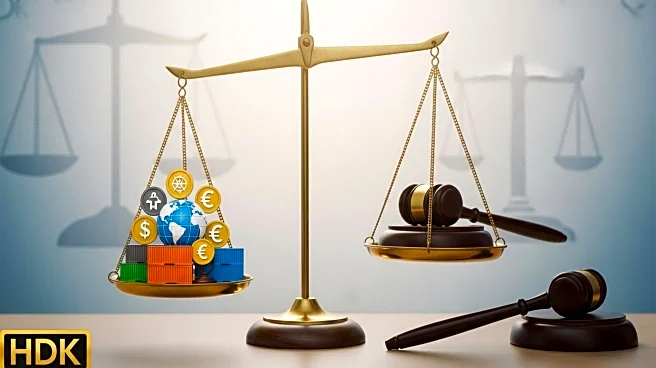What's Happening?
A federal appeals court has ruled against President Trump's tariff policies, stating that he exceeded his presidential powers by imposing financial measures on nearly all countries globally. The Washington DC court's 7-4 decision highlighted that U.S. law grants significant authority to the president during a national emergency but does not permit the imposition of tariffs or taxes. The ruling challenges the legality of tariffs introduced by Trump on April 2, which included a 10% baseline tariff on most trading partners and higher tariffs on specific countries. The court found these measures to be beyond the legal limitations of the International Emergency Economic Powers Act (IEEPA), which Trump invoked to justify the tariffs. Although the court upheld a previous decision declaring the tariffs illegal, it delayed the immediate removal of the tariffs until October 14, allowing time for an appeal to the U.S. Supreme Court.
Why It's Important?
The court's decision has significant implications for U.S. trade policy and the economy. If the tariffs are ultimately struck down, the U.S. government may need to refund collected import taxes, potentially causing a financial strain on the treasury. Tariff revenue reached $159 billion by July, more than double the previous year's amount. The ruling also limits President Trump's ability to impose tariffs swiftly, potentially affecting his trade agenda. The decision could lead to increased economic uncertainty and impact global trade relations, as tariffs have been a central tool in Trump's strategy to address trade imbalances and protect American workers.
What's Next?
The Trump administration is expected to appeal the decision to the U.S. Supreme Court, which will have the final say on the legality of the tariffs. The administration has until October 14 to pursue this appeal. If the Supreme Court upholds the lower court's ruling, it could force a reevaluation of U.S. trade policy and impact future tariff implementations. The decision may also influence political discourse, as tariffs have been a contentious issue, with critics arguing they harm consumers and businesses by increasing costs.
Beyond the Headlines
The ruling raises questions about the scope of presidential powers and the balance between executive authority and legislative oversight in trade policy. It highlights the legal and ethical considerations of using national emergency declarations to justify economic measures. The decision may prompt discussions on the need for clearer guidelines and limitations on presidential powers in trade matters, potentially leading to legislative reforms.









